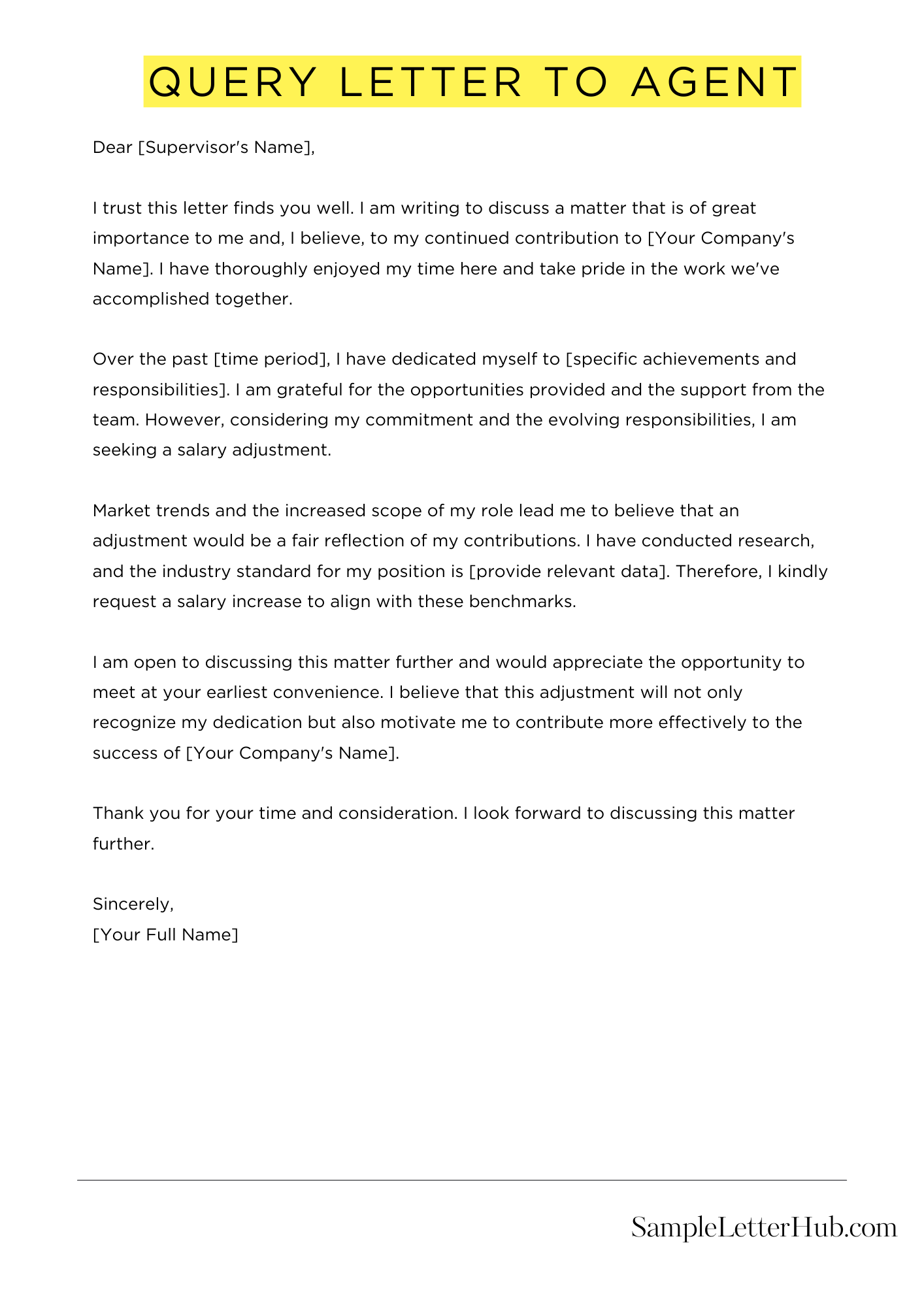Query Letter To Agent is a letter that writers send to literary agents to pitch their book or manuscript. The purpose of this letter is to convince the agent to represent the writer and their work.
It is a crucial step in the publishing process, as agents are the gatekeepers to the publishing industry.
In this article, we will provide templates, examples, and samples of Query Letter To Agent. Our aim is to make it easy for writers to write a compelling letter that will grab the attention of the agent.
We understand that writing a Query Letter To Agent can be daunting, but with our help, writers can craft a letter that showcases their writing skills and the potential of their work.
Whether you are a first-time writer or an experienced author, our samples will guide you through the process of writing a Query Letter To Agent.
We believe that every writer deserves a chance to be heard, and we hope that our article will help writers achieve their publishing goals.
Query Letter To Agent
Dear [Agent’s Name],
I trust this letter finds you well. My name is [Your Name], and I am reaching out to you in the hopes of securing representation for my [genre] manuscript titled “[Your Book Title].” After researching and admiring your work representing authors in the [specific genre] genre, I am confident that your expertise aligns perfectly with my literary goals.
[Briefly introduce yourself and your writing background. Mention any relevant writing achievements or publications, if applicable.]
The story revolves around [provide a brief synopsis of your book]. I believe it offers a fresh perspective on [mention any unique aspects or themes in your book]. I have attached [sample chapters/the full manuscript] for your consideration. I would be delighted to provide any additional materials you may require.
I am particularly drawn to your agency because of [mention any specific reasons why you’re interested in the agent or agency]. I am confident that, with your guidance, we can bring [Your Book Title] to a wider audience and achieve mutual success.
Thank you very much for considering my query. I look forward to the possibility of working together. I have included my contact details below and would be grateful for the opportunity to discuss my manuscript further at your convenience.
Thank you for your time and consideration.
Sincerely,
[Your Full Name]
Query Letter To Literary Agent
Dear [Agent’s Name],
I trust this letter finds you well. My name is [Your Name], and I am reaching out to you in the hopes of securing representation for my [genre] manuscript titled “[Your Book Title].” After researching and admiring your work representing authors in the [specific genre] genre, I am confident that your expertise aligns perfectly with my literary goals.
[Briefly introduce yourself and your writing background. Mention any relevant writing achievements or publications, if applicable.]
The story revolves around [provide a brief synopsis of your book]. I believe it offers a fresh perspective on [mention any unique aspects or themes in your book]. I have attached [sample chapters/the full manuscript] for your consideration. I would be delighted to provide any additional materials you may require.
I am particularly drawn to your agency because of [mention any specific reasons why you’re interested in the agent or agency]. I am confident that, with your guidance, we can bring [Your Book Title] to a wider audience and achieve mutual success.
Thank you very much for considering my query. I look forward to the possibility of working together. I have included my contact details below and would be grateful for the opportunity to discuss my manuscript further at your convenience.
Thank you for your time and consideration.
Sincerely,
[Your Full Name]
Query Letter For Misconduct
Dear [Recipient’s Name],
I hope this letter finds you well. I am writing to bring to your attention a matter of significant concern related to alleged misconduct within [Company/Organization Name]. My purpose is to formally request an investigation into the reported incidents and seek a resolution to ensure a safe and ethical work environment for all employees.
It has come to my attention that there have been several instances of [describe the nature of the misconduct] occurring within the workplace. These incidents have raised serious concerns among the employees, impacting morale and creating an uncomfortable atmosphere.
I believe it is crucial to address these issues promptly and impartially. It is in the best interest of the organization to conduct a thorough investigation into the alleged misconduct, identify the responsible parties, and implement appropriate corrective measures to prevent future occurrences.
I am attaching a detailed document outlining the specific incidents, including dates, times, and the individuals involved. I kindly request that this matter be treated with the utmost confidentiality and urgency to maintain the integrity of the investigation process.
Thank you for your attention to this matter. I trust that [Company/Organization Name] will handle this situation transparently and take the necessary steps to address and rectify the reported misconduct.
Sincerely,
[Your Full Name]
Short Query Letter To Agent
Dear [Agent’s Name],
I hope this letter finds you well. I am reaching out to you because of your reputation for representing talented authors in the [genre] genre. I am currently seeking representation for my [genre] manuscript titled “[Your Book Title].”
The story revolves around [brief description of your book]. I believe it would be a great fit for your list, considering your success with [mention a relevant book or author represented by the agent].
I have attached a brief synopsis and the first three chapters for your review. I would be honored if you could spare some time to consider representing my work. I look forward to the opportunity to discuss how my book could contribute to your distinguished portfolio.
Thank you for considering my query. I appreciate your time and attention to new voices in the literary world.
Sincerely,
[Your Full Name]
Fiction Query Letter To Agent
Dear [Agent’s Name],
I hope this letter finds you in good spirits. I am writing to you regarding my novel, “[Your Book Title],” a captivating work of fiction that I believe aligns with your interests and expertise.
The story unfolds in [brief setting or context] and follows the journey of [main character’s name], who [brief description of the main plot]. With its unique blend of [genre elements], I am confident that my manuscript will offer a fresh and engaging perspective to readers.
[Your Book Title] is complete at [word count] words and has undergone several rounds of editing to ensure a polished and compelling narrative. I have attached the first three chapters and a synopsis for your review.
I am enthusiastic about the prospect of working with you and believe that your representation can help bring this story to a wider audience. Thank you for considering my query, and I look forward to the possibility of discussing my manuscript further.
Sincerely,
[Your Full Name]

How to Write a Query Letter to an Agent
If you’re an aspiring author, you know that getting your work published can be a daunting task. One of the first steps in the process is writing a query letter to an agent. A query letter is a one-page letter that introduces you and your work to an agent. It’s your chance to make a great first impression and convince the agent to request your manuscript. Here are seven steps to help you write a successful query letter.
1. Research Agents
Before you start writing your query letter, you need to research agents who represent your genre. Look for agents who have represented books similar to yours and who are currently accepting submissions. You can find this information on the agent’s website or on websites like QueryTracker or Manuscript Wishlist.
2. Address the Agent Personally
When you’ve found an agent you want to query, address the letter to them personally. Avoid using generic salutations like “”Dear Agent”” or “”To Whom It May Concern.”” Use the agent’s name and spell it correctly. This shows that you’ve done your research and that you’re serious about your work.
3. Hook the Agent
The first paragraph of your query letter should hook the agent and make them want to keep reading. Start with a strong opening sentence that grabs their attention. You could start with a question, a surprising fact, or a statement that highlights the unique aspect of your book.
4. Summarize Your Book
The next paragraph should summarize your book in a concise and compelling way. Focus on the main plot and the protagonist. Avoid giving away the ending or too many details. Keep it short and sweet.
5. Highlight Your Credentials
In the third paragraph, highlight your credentials as a writer. This could include any writing awards you’ve won, your education, or any relevant experience. If you don’t have any writing credentials, focus on your passion for writing and your dedication to your craft.
6. Include a Call to Action
In the fourth paragraph, include a call to action. Ask the agent if they would be interested in reading your manuscript and offer to send it to them. Make sure to thank them for their time and consideration.
FAQs About Query Letter to an Agent
1. What is a query letter, and why is it important?
A query letter is a one-page letter that introduces an author and their work to a literary agent. It is the first step in the process of getting a book published. A well-written query letter can make a good impression on an agent and increase the chances of getting a book deal.
2. What should be included in a query letter?
A query letter should include a brief introduction of the author, a synopsis of the book, and any relevant information about the author’s writing experience or credentials. It should also include a polite request for the agent to consider the manuscript.
3. How long should a query letter be?
A query letter should be no longer than one page. Agents receive hundreds of query letters every week, so it is important to keep the letter concise and to the point.
4. Should I personalize my query letter?
Yes, it is always a good idea to personalize your query letter. Agents receive many generic query letters, so a personalized letter can make a good impression. Research the agent and mention why you think they would be a good fit for your book.
5. How do I know which agent to send my query letter to?
Research agents who represent books in your genre. Look for agents who have represented books similar to yours. You can also attend writing conferences and workshops to meet agents in person.
6. How long should I wait for a response to my query letter?
Agents receive many query letters, so it can take several weeks or even months to receive a response. If you haven’t heard back after six to eight weeks, you can send a polite follow-up email.
7. What should I do if I receive a rejection letter?
Rejection is a normal part of the publishing process. Don’t take it personally. Use the feedback to improve your query letter and manuscript. Keep submitting to other agents and publishers. Persistence is key in the publishing industry.
Related:
- Property Management Letter To Owners ( 5 Samples )
- Change Of Ownership Letter To Vendors ( 5 Samples)
- Letter To Extend Maternity Leave ( 5 Samples)
- Authorization Letter For Minor To Travel Without Parents (5 Samples)
- Complaint Letter To Car Dealership ( 5 Samples)

